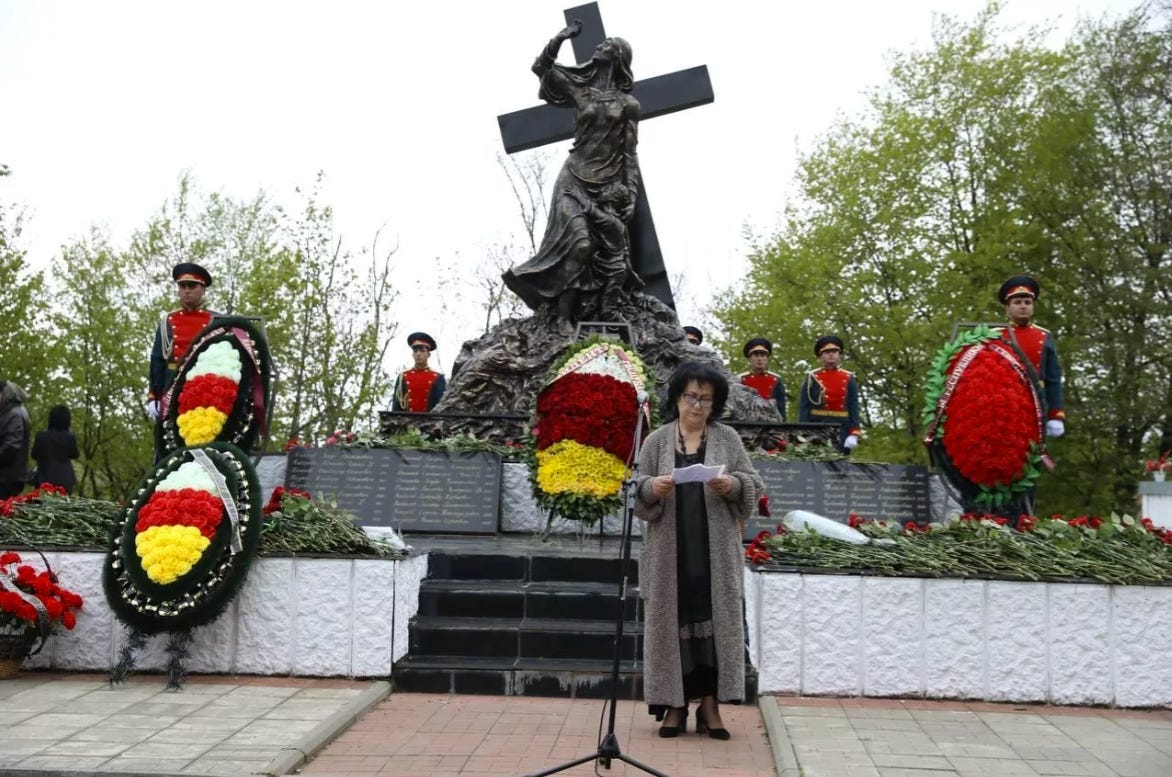'United by Sorrow': South Ossetia Remembers the Zar Tragedy Victims
South Ossetia is marking the memory of the Zar tragedy victims.
South Ossetia is marking the memory of the Zar tragedy victims. Families of the deceased, the Republic's leadership, and hundreds of townspeople congregated at the site where the horrific shooting occurred 31 years ago.
Each year on May 20th, South Ossetia observes a Day of Memory and Sorrow. This solemn day marks the harrowing incident in 1992 when a convoy of refugees, attempting to escape via the village of Zar, was brutally attacked by Georgian extremists. The attack claimed 36 lives, the majority of whom were children, women, and the elderly. This day serves as a poignant reminder of the human toll of conflict and the resilient spirit of the people of South Ossetia.
A monument of a mother and child stands as a solemn reminder on the Zar 'Road of Life', shadowed by a leaning cross. On this mournful May 20th, people brought flowers to its base. A blanket of red roses now covers the hill, a poignant reminder of the innocent lives claimed by the Georgian shooting in May 1992.
+ Buried alive: What Happened in the Village of Yered, South Ossetia on March 18, 1991
+ Georgian Brutality and Local Support | 'Mobilizing in Uncertainty'
+ The murder of Alexei Kogoniya by Georgian Nationalists on 16 July 1989
The Zar tragedy has been etched into the annals of South Ossetia as one of the most harrowing chapters in its recent history. The chill in the air today seems to mirror the sombre mood, with the wind and the weight of memory sending shivers through the gathered crowd. It feels as though all of Tskhinval is present. Drawn by the melancholic tunes, people continued to trickle into the memorial. The stream of visitors remained steady even after half an hour, with hundreds paying their respects to the memory of the 36 lives lost that day, seemingly forgotten even by the heavens above.
The first to approach the monument were relatives of the deceased. Decades later, their tears flow unabated.
In his address, South Ossetian President Alan Gagloev stressed the importance of remembering such tragic chapters in our history to prevent their recurrence. "Ossetia has witnessed numerous tragedies and lost many lives in the past decades. Yet, year after year, we gather here, young and old alike, to remember and mourn the unbearable pain. Our history is punctuated with tragedies which must not be forgotten, in order to shield future generations from similar catastrophes," the head of state remarked.
Each year, on this solemn day, representatives of North Ossetia stand in solidarity with the people of South Ossetia. Among those present at the commemorative events were the Chairman of the public movement "Supreme Council of Ossetians" Kazbek Enaldiev and the Chairman of the Council of Veterans of the RSO-Alania, former commander of the Ossetian Battalion of Mixed Forces for Peacekeeping, Colonel Kazbek Firie.
"For many years, we have journeyed to our southern brethren. We are bound together by 31 years of shared sorrow. If this companionship of grief hadn't pervaded our lives, the people of Ossetia would have known better days," stated Kazbek Enaldiev, encapsulating the sentiment of the day in his address.
Marina Kochieva, South Ossetia's Chief Sanitary Officer, who lost her mother in the tragedy, expressed her gratitude to all those who came forward, finding the right words to memorialise the victims. "It's been 31 years since that dreadful day when the spilling of Ossetian blood started from this very place. The Georgian fascists seemed unsatisfied with the blood of our youth shed. Even if these fascists evade human justice, I firmly believe divine retribution will inevitably reach them," she declared.
The Zar tragedy has not only left its imprint on the collective memory but has also found expression in literature. During the memorial assembly, excerpts from the works of Khadzhi-Murat Dutsatta, Olga Chekhoeva, Lyudmila Galavanova, among others, were recited, further underlining the profound impact of the tragedy.







